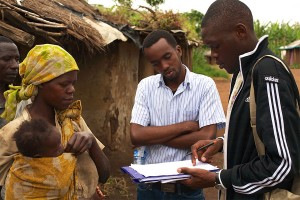Webinar: Strengthening M&E for Malaria Social and Behavior Change Communication
 Despite the progress and successes in malaria social and behavior change communication (SBCC), there are still important gaps in our understanding of how best to target, package and deliver effective communication campaigns. These gaps can be attributed to limited research and evaluation, such as dissemination of results, in malaria SBCC. Constraints to research and evaluation include capacity limitations and lack of clarity on best practices for measuring the contribution of SBCC to malaria control efforts.
Despite the progress and successes in malaria social and behavior change communication (SBCC), there are still important gaps in our understanding of how best to target, package and deliver effective communication campaigns. These gaps can be attributed to limited research and evaluation, such as dissemination of results, in malaria SBCC. Constraints to research and evaluation include capacity limitations and lack of clarity on best practices for measuring the contribution of SBCC to malaria control efforts.
Join HC3 on Tuesday, November 12, 2014 at 10 am – 11am EST for: Strengthening M&E for Malaria Social and Behavior Change Communication
The malaria SBCC community is working to develop resources and guidance to address these challenges. Two such resources, the Malaria BCC Indicator Reference Guide and the Reporting Guide for Malaria Communication Evaluations aim to support national programs and partners to more robustly evaluate the effectiveness of communication interventions and to share and disseminate those findings within the malaria community so that effective interventions can be recognized as such and replicated in other settings.
Reviewing these tools, we will explain how they are intended to be used to strengthen monitoring and evaluation (M&E) for malaria SBCC and expand the evidence base for successful programming. We will also discuss the use of SBCC reference guide indicators in a recent Liberia survey. The survey data raises a number of questions and the webinar will conclude with a discussion about what the findings mean for future work with the indicators.
We anticipate that the webinar presentations will prompt discussion. To that end, we encourage questions and comments from participants.
Presenters:
Jessica Butts, MPH, MSW
 Ms. Butts is a Health Scientist in the Malaria Branch of the Centers for Disease Control and Prevention (CDC) working under the President’s Malaria Initiative (PMI). She received Masters degrees in Public Health and Social Work from Tulane University in 2006 with a focus on International Health and Development and Monitoring and Evaluation. Her work with PMI has focused primarily on M&E and Behavior Change Communications. Within M&E her areas of interest include routine information system strengthening, surveillance and data quality assessment. She has also focused on M&E of BCC, specifically indicator development and evaluation planning. She currently serves as a co-chair for the RBM Communications Community of Practice M&E Task Force. Prior to joining PMI, Jessica was a research analyst working in evaluation planning and implementation for U.S.-based public health programs in New Orleans, including youth violence, suicide, and HIV prevention.
Ms. Butts is a Health Scientist in the Malaria Branch of the Centers for Disease Control and Prevention (CDC) working under the President’s Malaria Initiative (PMI). She received Masters degrees in Public Health and Social Work from Tulane University in 2006 with a focus on International Health and Development and Monitoring and Evaluation. Her work with PMI has focused primarily on M&E and Behavior Change Communications. Within M&E her areas of interest include routine information system strengthening, surveillance and data quality assessment. She has also focused on M&E of BCC, specifically indicator development and evaluation planning. She currently serves as a co-chair for the RBM Communications Community of Practice M&E Task Force. Prior to joining PMI, Jessica was a research analyst working in evaluation planning and implementation for U.S.-based public health programs in New Orleans, including youth violence, suicide, and HIV prevention.
Stella Babalola, PhD
 Dr. Babalola is a Johns Hopkins Bloomberg School of Public Health Center for Communication Programs senior research advisor. Her research areas include strategic communication, gender roles, adolescent reproductive health, quantitative methods for assessing the effects of communication programs and qualitative audience studies.
Dr. Babalola is a Johns Hopkins Bloomberg School of Public Health Center for Communication Programs senior research advisor. Her research areas include strategic communication, gender roles, adolescent reproductive health, quantitative methods for assessing the effects of communication programs and qualitative audience studies.
Recently, Dr. Babalola’s main research projects have dealt with sexual attitudes and behaviors among African youth; community influences on VCT-seeking behaviors, factors influencing the uptake of childhood immunization and program effects using cross sectional data.
Emily Ricotta, ScM
 Ms. Ricotta is a Senior Research Assistant at the Johns Hopkins Bloomberg School of Public Health Center for Communication Programs (JHU∙CCP). She has almost ten years of research experience in molecular microbiology and epidemiology working with many different pathogens including Salmonella, Clostridium difficile, Haemophilus ducreyi, Methicillin-resistant Staphylococcus aureus and malaria. Before joining JHU∙CCP, she was responsible for foodborne disease surveillance and outbreak investigation for the state of Maryland. Currently, Emily provides analytical support for multiple projects within JHU∙CCP, specializing in study design and quantitative analysis. Additionally, she is involved with designing and implementing a monitoring system for an Ebola prevention communication campaign in Liberia. Emily obtained her Master of Science degree in molecular microbiology and immunology from the Johns Hopkins Bloomberg School of Public Health, where she conducted research on malaria epidemiology in Macha, Zambia with the Johns Hopkins Malaria Research Institute.
Ms. Ricotta is a Senior Research Assistant at the Johns Hopkins Bloomberg School of Public Health Center for Communication Programs (JHU∙CCP). She has almost ten years of research experience in molecular microbiology and epidemiology working with many different pathogens including Salmonella, Clostridium difficile, Haemophilus ducreyi, Methicillin-resistant Staphylococcus aureus and malaria. Before joining JHU∙CCP, she was responsible for foodborne disease surveillance and outbreak investigation for the state of Maryland. Currently, Emily provides analytical support for multiple projects within JHU∙CCP, specializing in study design and quantitative analysis. Additionally, she is involved with designing and implementing a monitoring system for an Ebola prevention communication campaign in Liberia. Emily obtained her Master of Science degree in molecular microbiology and immunology from the Johns Hopkins Bloomberg School of Public Health, where she conducted research on malaria epidemiology in Macha, Zambia with the Johns Hopkins Malaria Research Institute.








Leave a Reply
Want to join the discussion?Feel free to contribute!